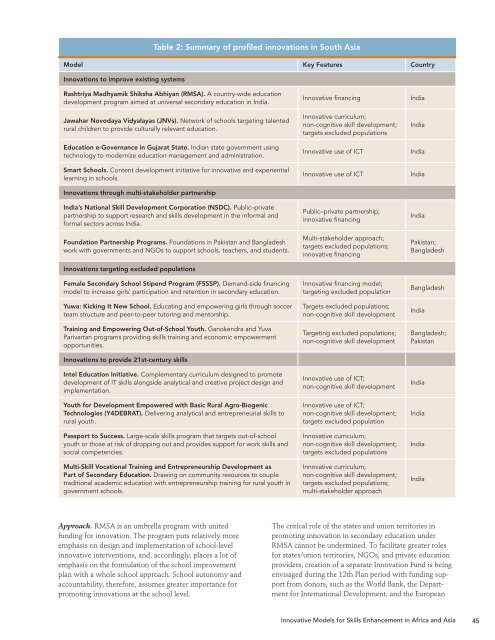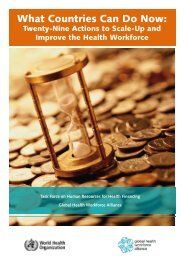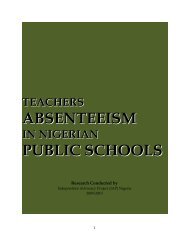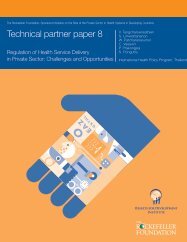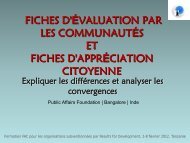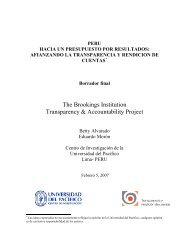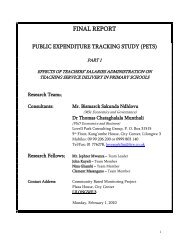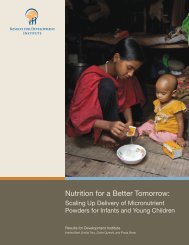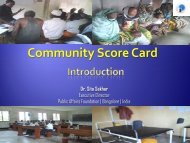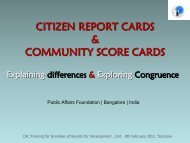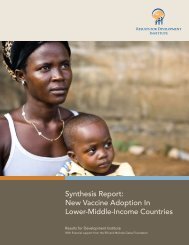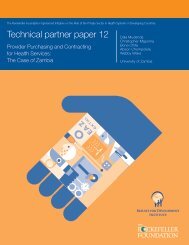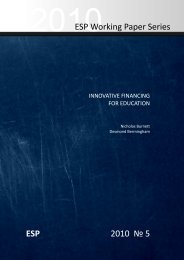Innovative Secondary Education For Skills Enhancement
Innovative Secondary Education For Skills Enhancement
Innovative Secondary Education For Skills Enhancement
You also want an ePaper? Increase the reach of your titles
YUMPU automatically turns print PDFs into web optimized ePapers that Google loves.
Table 2: Summary of profiled innovations in South Asia<br />
Model Key Features Country<br />
Innovations to improve existing systems<br />
Rashtriya Madhyamik Shiksha Abhiyan (RMSA). A country-wide education<br />
development program aimed at universal secondary education in India.<br />
Jawahar Novodaya Vidyalayas (JNVs). Network of schools targeting talented<br />
rural children to provide culturally relevant education.<br />
<strong>Education</strong> e-Governance in Gujarat State. Indian state government using<br />
technology to modernize education management and administration.<br />
Smart Schools. Content development initiative for innovative and experiential<br />
learning in schools.<br />
Innovations through multi-stakeholder partnership<br />
India’s National Skill Development Corporation (NSDC). Public–private<br />
partnership to support research and skills development in the informal and<br />
formal sectors across India.<br />
Foundation Partnership Programs. Foundations in Pakistan and Bangladesh<br />
work with governments and NGOs to support schools, teachers, and students.<br />
Innovations targeting excluded populations<br />
Female <strong>Secondary</strong> School Stipend Program (FSSSP). Demand-side financing<br />
model to increase girls’ participation and retention in secondary education.<br />
Yuwa: Kicking It New School. Educating and empowering girls through soccer<br />
team structure and peer-to-peer tutoring and mentorship.<br />
Training and Empowering Out-of-School Youth. Ganokendra and Yuva<br />
Parivartan programs providing skills training and economic empowerment<br />
opportunities.<br />
Innovations to provide 21st-century skills<br />
Intel <strong>Education</strong> Initiative. Complementary curriculum designed to promote<br />
development of IT skills alongside analytical and creative project design and<br />
implementation.<br />
Youth for Development Empowered with Basic Rural Agro-Biogenic<br />
Technologies (Y4DEBRAT). Delivering analytical and entrepreneurial skills to<br />
rural youth.<br />
Passport to Success. Large-scale skills program that targets out-of-school<br />
youth or those at risk of dropping out and provides support for work skills and<br />
social competencies.<br />
Multi-Skill Vocational Training and Entrepreneurship Development as<br />
Part of <strong>Secondary</strong> <strong>Education</strong>. Drawing on community resources to couple<br />
traditional academic education with entrepreneurship training for rural youth in<br />
government schools.<br />
<strong>Innovative</strong> financing<br />
<strong>Innovative</strong> curriculum;<br />
non-cognitive skill development;<br />
targets excluded populations<br />
<strong>Innovative</strong> use of ICT<br />
<strong>Innovative</strong> use of ICT<br />
Public–private partnership;<br />
innovative financing<br />
Multi-stakeholder approach;<br />
targets excluded populations;<br />
innovative financing<br />
<strong>Innovative</strong> financing model;<br />
targeting excluded population<br />
Targets excluded populations;<br />
non-cognitive skill development<br />
Targeting excluded populations;<br />
non-cognitive skill development<br />
<strong>Innovative</strong> use of ICT;<br />
non-cognitive skill development<br />
<strong>Innovative</strong> use of ICT;<br />
non-cognitive skill development;<br />
targets excluded population<br />
<strong>Innovative</strong> curriculum;<br />
non-cognitive skill development;<br />
targets excluded populations<br />
<strong>Innovative</strong> curriculum;<br />
non-cognitive skill development;<br />
targets excluded populations;<br />
multi-stakeholder approach<br />
India<br />
India<br />
India<br />
India<br />
India<br />
Pakistan;<br />
Bangladesh<br />
Bangladesh<br />
India<br />
Bangladesh;<br />
Pakistan<br />
India<br />
India<br />
India<br />
India<br />
Approach. RMSA is an umbrella program with united<br />
funding for innovation. The program puts relatively more<br />
emphasis on design and implementation of school-level<br />
innovative interventions, and, accordingly, places a lot of<br />
emphasis on the formulation of the school improvement<br />
plan with a whole school approach. School autonomy and<br />
accountability, therefore, assumes greater importance for<br />
promoting innovations at the school level.<br />
The critical role of the states and union territories in<br />
promoting innovation in secondary education under<br />
RMSA cannot be undermined. To facilitate greater roles<br />
for states/union territories, NGOs, and private education<br />
providers, creation of a separate Innovation Fund is being<br />
envisaged during the 12th Plan period with funding support<br />
from donors, such as the World Bank, the Department<br />
for International Development, and the European<br />
<strong>Innovative</strong> Models for <strong>Skills</strong> <strong>Enhancement</strong> in Africa and Asia 45


